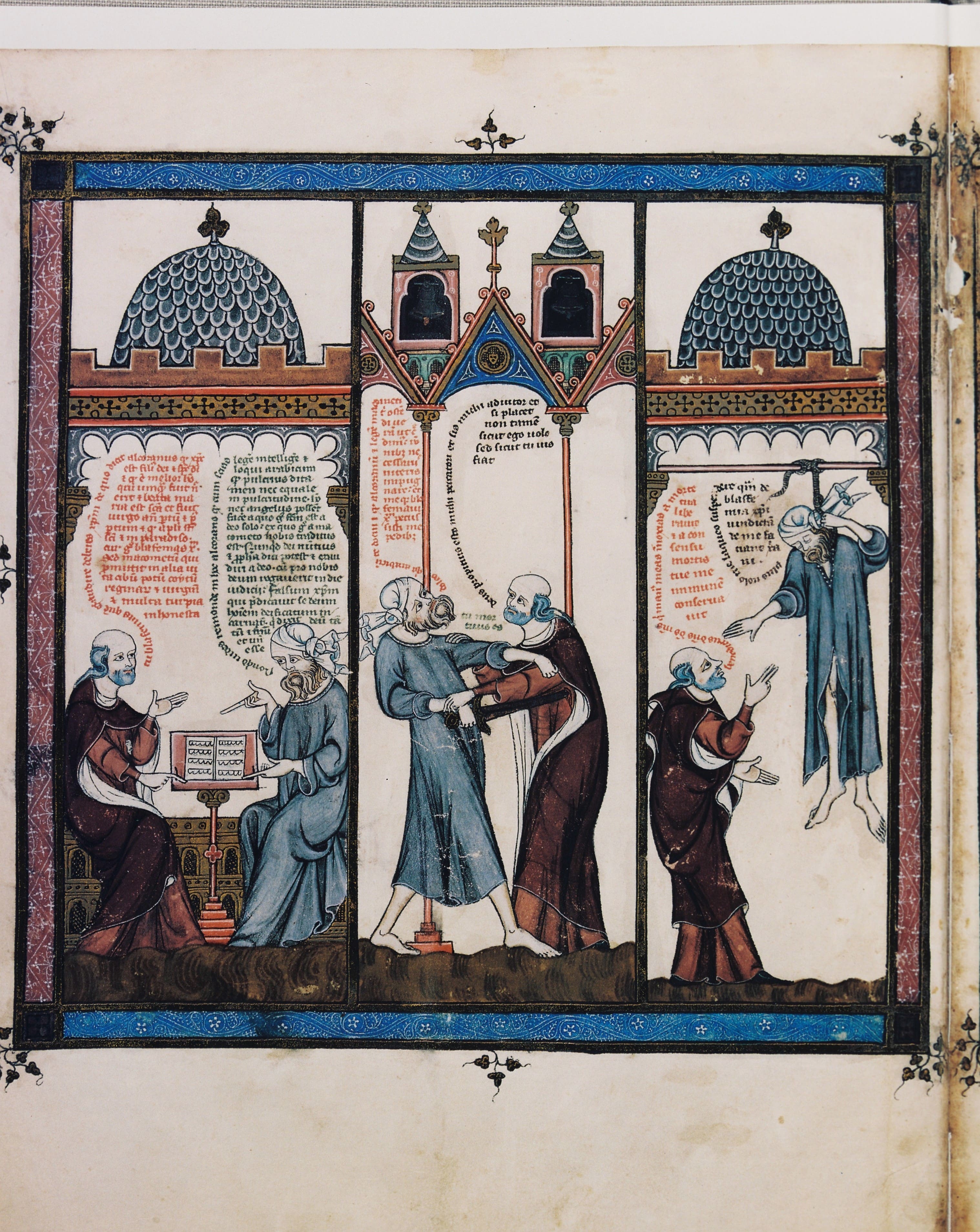- Introduction
- Context
- Life
- Thought
-
Works
- The multilingual nature of Llull's works
- Llull and the catalan language
- Diffusion and preservation
- Book of Contemplation
- Book of the Gentile
- Book of the Order of Chivalry
- Doctrina pueril
- Romance of Evast and Blaquerna
- Book of the Lover and the Beloved
- Ars demonstrativa
- Felix or the Book of Wonders
- Book of the Beasts
- Desconhort
- Tree of Science
- Exemplary Tree
- Cant de Ramon
- Rhetorica nova
- Logica nova
- Liber de fine
- Ars brevis
- Phantasticus
- Ars brevis praedicationis
- Gallery of images
- Database / Dictionary
Ramon Llull and the Arabic culture
The knowledge of Arabic possessed by Ramon Llull made him a unique case amongst Latin theologians. He was very proud of his command of this language, as his frequent references to his capabilities in this field show. Not only did he occasionally cite and explain certain Arabic words, but on at least one occasion also he defended the unusual Latin verbal forms which he had coined himself as being modelled upon the ‘modus loquens arabicus’ (‘the Arabic manner of speaking’). He often noted in his works of dialogue with Islam that they were written not only in Latin, but also in Arabic. At the outset of his long literary career he composed the original version of the Book of Contemplation. The original Arabic version of his Compendium logicae Algazeli / Lògica del Gatzell dates from the same period.
Llull’s works seem to have been worthy of a degree of interest in North Africa. We know of a debate which took place in 1394 in the palace of the Sultan of Fez, concerning one of Llull’s late treatises.
While Latin scholastics were familiar with only the comparatively few Arabic philosophical works which had been translated into Latin, Llull stood out from the rest on account of his knowledge, not only of Arabic philosophy, but also of the Islamic faith. He often made references to the Qur’anׂ and cited a specific text (Sura CXIII 3) on at least one occasion. He was familiar not only with the Qur’an, but also with the ‘Hadith’ and the commentaries of Muslim scholars upon the collected traditions. He was also familiar with Muslim ritual practices. In the Book of the Gentile he gave a popular summary of Muslim beliefs in twelve articles, and in the Doctrina pueril he told of the origins of Islam in a way which, unfortunately, reflected the distortions of Christian polemics.
Parallels to Llull’s chief preoccupations can be found in Islamic mystical literature. He held the belief that one could achieve proximity to the true God through the contemplation of the divine names. He called the divine names ‘dignities’ or ‘virtues’, of which he included nine in the definitive version of the Art: goodness, greatness, eternity, power, wisdom, will, virtue, truth and glory. Ramon believed that by contemplating different combinations of these names, which were common to all religions, one could arrive at an understanding between Muslims and Jews, and between Greek and Latin Christians. In keeping with this notion, he composed dialogues, such as the Book of the Gentile, in which wise men represented the different world religions.
Source: Charles Lohr, “Ramon Llull: ‘christianus arabicus’, Randa 19, 1986, pp. 9-11.
A number of scholars have tried to specify the actual sources of the borrowed elements of certain aspects of Llull’s thought without, however, being able to furnish definitive proof. One of the most recent efforts is that of Charles Lohr in the above-mentioned article from Randa 19. There he proposes an Arabic source for the definitive form taken by the Lullian Art (1289-1308: from the Ars inventiva veritatis, and the Taula general, to the Ars generalis ultima): the Budd al-‛arif by the Muslim theologian and philosopher Ibn Sab‛in of Murcia (1217/18-1269/71). The logic of the Budd al-‛arif, in fact, shows certain very evident parallels with Llull’s Logica nova (1303).

The Vita coetanea explains that Ramon Llull learned Arabic from a Moorish slave among his staff. When the Blessed Ramon tried to lead his teacher towards Christianity, this latter rebelled to the point of attacking his master. The punishment for a rebellious slave was death: Llull’s slave spent time in prison while he [Llull] prayed to God to relieve his anguish. This charming anecdote shows the constant tension which accompanied relationships between Christians and Muslims in the 13th century, even when there existed a particular predisposition towards a mutual understanding, as in Llull’s case.